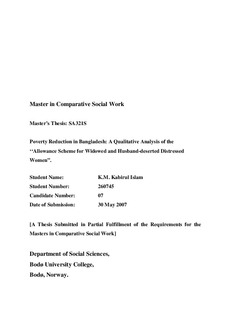Poverty reduction in Bangladesh: A qualitative analysis of the "Allowance Scheme for Widowed and Husband-deserted Distressed Women"
Master thesis

Åpne
Permanent lenke
http://hdl.handle.net/11250/139961Utgivelsesdato
2007Metadata
Vis full innførselSamlinger
Sammendrag
While Bangladesh has been persistently trying to overcome the poverty regime, yet most of
the distressed widowed, divorced and husband-deserted women are struggling hard to subsist
due to impoverished economic condition. The Government of Bangladesh has given due
attention in the recent past to empower these disadvantaged groups of people. The
“Allowance Scheme for Widowed and Husband-deserted Distressed Women” is one of the
major state interventions as a social safety net program, which delivers cash support to the
target people. This research intends to capture some of the impacts of this Scheme on the
lives of the beneficiaries as a means of poverty reduction and reveal some policy guidelines
for making the Scheme more effective and comprehensive.
The study has used a qualitative approach to analyze and interpret data that have been
collected through interview with the help of a semi-structured questionnaire from two groups
of respondents: the beneficiaries and the non-beneficiaries. In addition, a Focus Group
Discussion (FGD) was organized to collect data from and share insight with the main
stakeholders of the Scheme including the selectors, the implementers, relevant government
officials and representative of local government and civil society.
The findings of the study revealed that the Scheme has important impact on the lives of the
rural distressed women, who are either widowed or divorced or deserted by their husbands, to
come out of severe insecurity of food, to have a better medical care and to manage
comparatively good clothes. By achieving these basic needs they have earned some degree of
dignity and honor in the family and society. On the other hand this study also unveiled some
deficiencies of this Scheme as a means of poverty reduction. It has failed to improve the
housing status and to create income generation opportunities for the distressed women and in
this way perpetuates their struggle against poverty.
However, the success of the Scheme depends on the expansion of contribution in terms of
total coverage and amount of money as well, because after their subsistence the distressed women need to manage some capital from the allowance to start a venture for increasing their income.
Beskrivelse
Mastergradsoppgave i "Comparative social work" - Høgskolen i Bodø, 2007